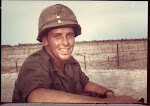SADR CITY, IRAQ: It’s been said that Sadr City is the last holdout, the toughest sector of Baghdad, and the largest geographic area within the city limits still not under the control of the al Malaki government. American GIs have built the Jamilla Road Wall, or ‘The Gold Wall’ as they refer to it that separates Sadr City into two unequal sectors. Theirs is the smallest, the southern end and is less than one fifth of the whole.
“We took fire practically the whole time it took to build that wall, “said Lt. Martin Suarez of the 1st Battalion, 6th Infantry, 1st Armored Division which is attached to the 4th Infantry Division. “We’ve been in country three months now but came under heavy fire the first day in the field here along the southern border of Sadr City.”
According to Lt. Suarez the reason for the wall was that this was the outer limits for rockets to be in range of the Green Zone, which had been taking somewhat heavy fire four or five months ago. Now the Americans control that outer limit location, hence no incoming at the Green Zone for some time.
The remaining four fifths of Sadr city is off limits to US military forces. It is controlled by the Iraqi Army (IA) supposedly, perhaps by the Mahadi Army in reality which is under the command of Muquada al Sadr, presently the most powerful cleric in Iraq. American troops have been explicitly forbidden from entering this zone by the Iraqi Prime Minister al Malaki.
On this bright morning the American Sector of Sadr City bustles with activity. Most people appear friendly, with open expressions on their faces. The kids are running around smiling and looking for candy. Schools aren’t yet functioning in most of Iraq and certainly not in this area of Sadr City.
Lt. Martin Suarez and his interpreter discuss the progress of a school project in Sadar City, Iraq that is being funded by the Americans.
“I can show you one that’s nearing completion on a very good remodeling job” said Lt. Suarez. “A good number of rebuilding projects have been started and funded by the US Army,” he said, “but completion always seems to be a problem, off in the distance somewhere. This one looks good though and ought to be able to open within the month.”
Lt. Col. John Digiambattista, Operations Officer of the 3rd Brigade Combat Team, 4th Infantry Division is a senior officer overseeing the Sadr City operations. He’s based at FOB War Eagle located a few klicks north of Sadr City.
“I’ve seen great progress over these last few months” said the Col. “We’re located in Old Adhamiyah which is nearly completely pacified. Sadr City is becoming the same way. Rather our sector is. The market’s open, people are out and walking around, looking happy. Some medical help is available. We’ve just got to keep it going. And by the way the so called SURGE was some help here, but we had a great deal going on beside that.”
A very different view can be found among the interpreters who work with every US unit in the field. Most of these ‘Terps’ (the term universally used for translators) will not let their real name be known to anyone. When they’re out working they wear a mask over their face, without fail.
“Do you want me to get killed?” said Lt. Suarez’s Terp. “I wouldn’t last five minuets if I walked out of this compound with this uniform on. And if I was recognized by anyone downtown this morning the same thing would happen, and they would kill my family.”
This implies rather directly, with great certainty that there are plenty of Iraqi’s on the streets who will view this ‘Terp’ as a traitor, a collaborator with the enemy, and who are ready to deal with him and his family accordingly.
Ra---ed, an older ‘Terp’ from FOB War Eagle doesn’t believe that the stability the US Army believes exists in Iraq is actually there. The whole issue of interpreters in Iraq can raise some interesting points. The whole of US Army policy passes through the mouths of mostly local, in some cases older foreigners from the US, in the Arabic language that no military personnel understand.
Sgt. Andrew Regean, Intelligence NCO for the 1st Battalion believes interpreters can be controlled with a smattering understanding of Arabic.
“They use their hands a great deal,” said SGT Reagan. “If you know how to read them and have picked up a few wards of Arabic, I believe we can control the ‘terps’ effectively. We have to. They’re all we have.”
A version of this article appeared in the Press Republican on August 11, 2008.


No comments:
Post a Comment